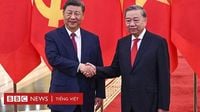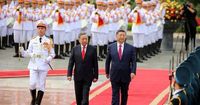Chinese President Xi Jinping made a state visit to Vietnam from April 14 to April 15, 2025, coinciding with Vietnam's commemoration of the 50th anniversary of the end of the North-South war. This visit, however, was overshadowed by the current challenges both countries face, particularly due to the pressure from U.S. tariffs.
Despite a three-month reprieve from the U.S. imposing a 46% tariff on Vietnamese goods, Vietnam is still under pressure to appease the administration of President Donald Trump. To convince the U.S., Hanoi has made several concessions, including commitments to purchase more American goods, reduce import tariffs on U.S. products, and allow American companies to invest in Vietnam, even in sensitive sectors like satellite internet.
The most critical concession that the U.S. is concerned about is how Vietnam will handle the demand from the Trump administration to prevent Chinese goods from being routed through Vietnam to enter the U.S. market. The U.S. is Vietnam's largest export market, accounting for 30% of its GDP, while China also plays a significant role in Vietnam's development. In 2024, Vietnam exported $136 billion worth of goods to the U.S. but imported $144 billion from China.
According to Professor Zachary Abuza from the National War College, China benefits significantly from Vietnam's trade relationship with the U.S. for two main reasons: "Vietnam is part of China's southern supply chain. Essentially, Vietnam assembles a lot of goods imported from China and then exports them to the U.S. That's why the export figures to the U.S. are equivalent to the import figures from China. The second reason is foreign investment from China into Vietnam. You can see Chinese factories everywhere from Hanoi to Haiphong."
During his visit, Xi emphasized the importance of economic ties between the two countries in an article published in Vietnam's Nhan Dan newspaper, stating, "China always regards Vietnam as a priority direction in its neighboring diplomatic policy." He also remarked on the ongoing U.S.-China trade war, asserting, "There are no winners in trade wars and tariff wars," and reminded his Vietnamese counterparts that they must steadfastly protect the multilateral trading system.
Prior to Xi's visit, Reuters reported that Vietnam committed to closely monitoring Chinese goods that use Vietnam as a transit point to enter the U.S. market. This raises questions about how China will react to these developments. Professor Carlyle Thayer pointed out that Xi is likely aware of the issue of Chinese goods being labeled as "Made in Vietnam" and will need to cooperate with Vietnam to address it, as it benefits China as well: "Xi is certainly aware of this issue. As long as China can export goods to Vietnam, which can then be exported to the U.S., both sides profit. They can't sell goods if the U.S. doesn't buy from Vietnam."
The phenomenon of Chinese goods being labeled as produced in Vietnam involves many Chinese products, although produced in China, being marked as manufactured in Vietnam. These goods are then stored in warehouses in Vietnam before being exported to the U.S. For Chinese companies, investing in Vietnam also helps them access the Southeast Asian market, especially as China's economy slows down.
Another reason China may not want to retaliate if Vietnam tightens controls on Chinese goods is that Beijing aims to replace the U.S. as the model nation for free trade, thereby gaining support from the rest of the world. Professor Zachary Abuza commented, "The Chinese are very skilled at messaging. They want the world to think that the Americans are the ones undermining the global order, while China is the responsible nation."
In response, China is likely to seek ways to further integrate its economy with Vietnam's, according to Professor Thayer. "China will look to strengthen the integration of its economy with Vietnam's, making the two economies more closely linked," he added.
During Xi's visit, Vietnam and China signed 45 economic cooperation agreements, including seven documents related to railroads and roads. These agreements are expected to enhance the connectivity of the transportation systems between the two countries, facilitating the movement of goods.
In a joint statement following the meetings, the leaders of Vietnam and China agreed to continue deepening their Comprehensive Strategic Cooperative Partnership and promote the building of a Community sharing the future of Vietnam and China with strategic significance. They emphasized the need to strengthen mutual support on the path toward socialism and to enhance strategic trust.
As Vietnam prepares for the 50th anniversary of its "Liberation Day," the visit by Xi Jinping was marked by significant discussions and agreements. The two sides agreed to maintain the stability of the global free trade system and the industrial and supply chains, amid the escalating U.S.-China trade war.
On April 14, 2025, the two countries agreed that China would conduct a feasibility study for two planned railway lines, with an estimated cost of 9.95 million yuan (approximately 35 billion dong). The agreements also included Vietnam's commitment to use Chinese loans to build new railways between the two countries, which is viewed as a crucial step to build trust and enhance bilateral trade.
Notably, on April 13, 2025, the Vietnamese government issued Decree 89/2025, amending regulations to allow aircraft imported into Vietnam to include those licensed or recognized by the Chinese aviation authority. This was part of a broader effort to improve cooperation in various sectors.
In the realm of education and technology, the two countries agreed to strengthen cooperation in key technology sectors. A memorandum of understanding was signed between the National University of Hanoi and Tsinghua University, officially establishing the "Vietnam-China University Network." This network aims to enhance educational cooperation and improve the quality of technical training in Vietnam.
Overall, Xi Jinping's visit to Vietnam was a significant event, marked by numerous agreements and discussions that reflect the complex dynamics of U.S.-China relations and their impact on Vietnam. As both nations navigate these challenges, the outcomes of this visit may shape the future of their partnership.


